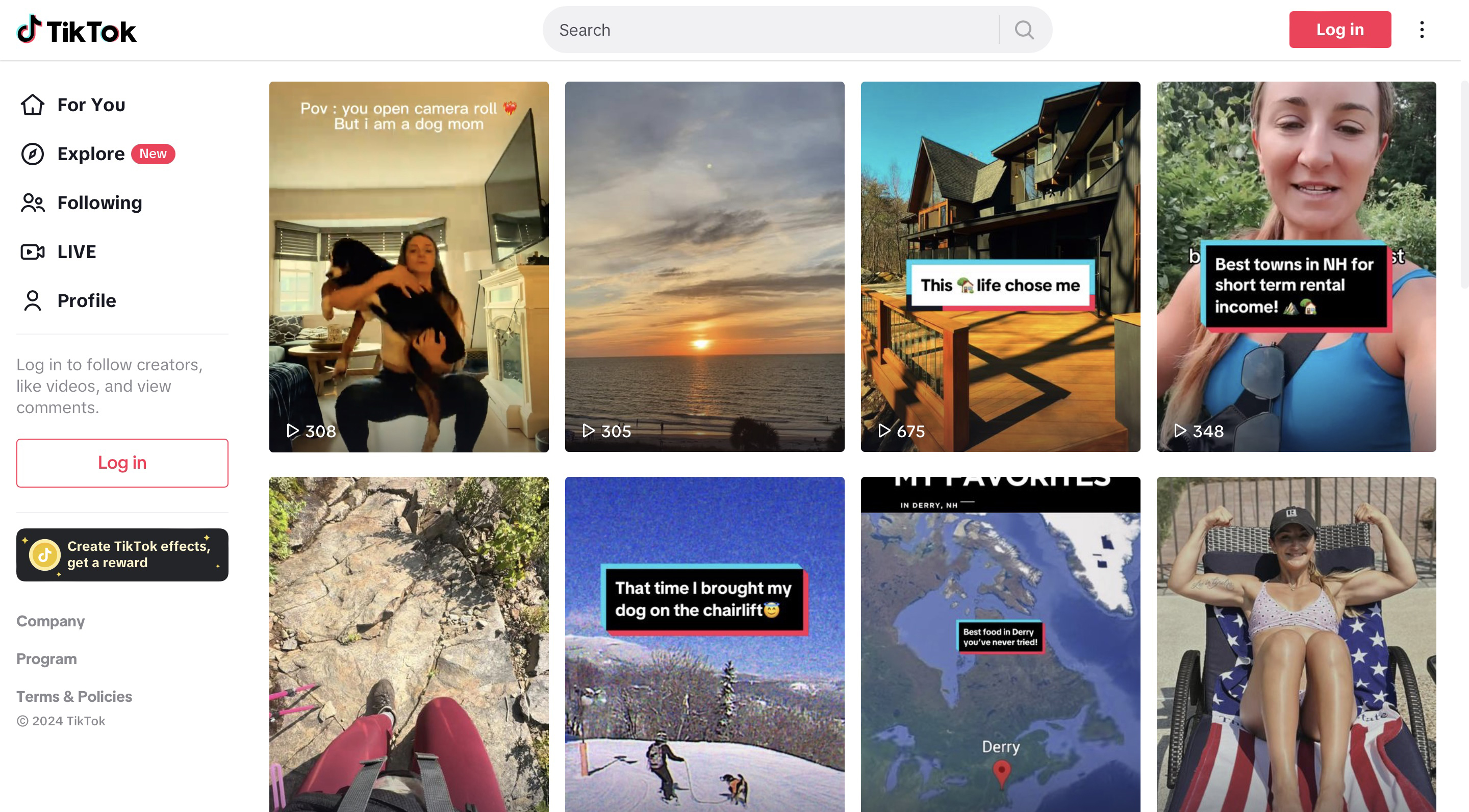Business owners in New Hampshire use short-form social media app to engage with customers

Alex Bellman, of Bellman Jewelers in Manchester, demonstrates what a typical TikTok recording session looks like in his office. (Photo by Trisha Nail) Holding up a gold-banded diamond ring, Alex Bellman explains the accessory’s features as he shows it to his phone’s front camera in his office.
“Hey guys, so I’m going to show you this unbelievable three-stone engagement ring we just created that has three radiant cut diamonds,” says Bellman, chief operating officer of his family’s namesake Manchester store Bellman Jewelers.
“Check this beautiful ring out. It’s in 14-karat white gold, and it’s accented by two half-karat radiants. And in the center, it has a carat-and-a-half radiant.”
He’s demonstrating how he speaks to a future audience of potential thousands on the social media app TikTok. Under his alias @thetruthfuljeweler, he’s amassed over a million views and just over 41,000 followers in just over four years. Those views have translated into real sales.
“I started putting out content on TikTok in 2020, and immediately, video No. 6 gets a million and a half views; it was unbelievable,” Bellman said in an interview a week before the demonstration. “We went from having five employees to 18 employees.”
The platform has also allowed Bellman to show off his custom 3D-printing process to create models of rings, which he mails to customers so they can view their orders before purchase.
“(3D printing) isn’t common in the industry; I don’t know of anyone in New Hampshire or the country who does it,” the jeweler said.
Bellman is among countless business owners in New Hampshire spanning many ages and professions who use the short-form video platform for work, a search on the app for “New Hampshire small business” finds. Not only do they market their businesses, some educate viewers and prospective customers about what they do.
Nationwide, Oxford Economics Group and TikTok released a study in April reporting that advertising and marketing on the platform contributed $14.7 million in revenue in 2023 to more than 7 million small and midsized American businesses who use the app. The report also highlighted that 224,000 jobs were created domestically among those businesses last year. The study was conducted before the launch of TikTok Shop in September 2023, which introduced a built-in e-commerce element to the platform.
Lately, Bellman is concerned about legal woes surrounding TikTok, owned and developed by Chinese tech titan ByteDance, operating in the United States as “TikTok Inc.” The state of New Hampshire filed a lawsuit in Merrimack County Superior Court in June against TikTok Inc., asserting that it violates the state’s consumer protection statute by using addictive design features that prey on children’s mental development and “maximize the time young users spend on the platform in the interest of profit.” The state alleges the company is aware of this and knows it creates a “cycle of excessive use result(ing) in profound harm to its young users, including depression, anxiety and isolation from friends and family.”
Federally, the situation is more complex. President Joe Biden signed a law in April to ban the app’s American operations unless TikTok Inc. divests from ByteDance. The U.S. government cites national security reasons for the law, claiming TikTok could be used by China’s government to distribute propaganda to the app’s 170 million American users.
In May, the company sued the U.S. Department of Justice, which has sided with Biden on the matter. TikTok says its case against the federal government may represent “the most sweeping speech restriction in the country’s history,” NPR reported. In turn, the Justice Department sued TikTok back in August with the Federal Trade Commission, asserting ByteDance broke the terms of an FTC consent decree formed after the app collected data from minors under age 13. Oral arguments for TikTok’s suit filed in May are set for Sept. 16 at a federal appeals court in D.C.
Should no sale occur, the federal law is poised to ban TikTok in the U.S. on Jan. 19, 2025, but will potentially grant a three-month extension if talk of divestment occurs.
“I’m afraid of a ban,” Bellman said. “I think that it seems politically motivated, and if it was really an evil app or bad or whatever they’re trying to say, I guess you have to trust the consumer to know better.”
For Bellman, TikTok has been a massive moneymaker for his jewelry store, with attention and successive sales transforming the business from financial peril earlier in the COVID-19 pandemic to fortune and profits.
“It’s mid-COVID and I’m thinking, ‘Oh boy, we’re going out of business because no one’s going to want jewelry,’” Bellman recalled. “I may be selling one ring a day; nothing’s going on. So, I see TikTok and I’m like, ‘You know what? I bet there’s people on TikTok who want (jewelry) information.”
That bet paid off, with Bellman’s TikTok following far exceeding his 3,500-follower base on Instagram. As for sales, while he didn’t share exact figures, Bellman said that before TikTok, he “might have done like $10,000 a month for one or two sales from Instagram.” Now, he says TikTok has been “bringing in multiple seven-figure (sales) per year.”
It’s also meant that Bellman Jewelers now routinely has customers coast-to-coast, vastly expanding its largely Northern New England footprint that was common before TikTok.
“Now, we’re getting people from Connecticut, Rhode Island, New York and New Jersey. They’re driving up here to meet and work with us,” Bellman said.

Tom Doyle, co-owner of Lowell, Massachusetts, business Alpine Butcher, has seen his small local butcher shop gain a nationwide following through TikTok. (Courtesy photo)
Hot properties, favorite hikes
Cayley Lord has experienced similar nationwide networking thanks to her TikTok presence. She deals in real estate, not rings, but she says the platform has allowed her to find leads on homebuyers “across the country” and turn their attraction into property transactions, via her account @thelordofrealestate.
“I try a lot to promote my favorite local businesses, favorite local hikes and destinations or events coming up,” said Lord, who lives in Bedford but sells homes all over the state. “I try to spread information about how great New Hampshire is, but TikTok is where I’m seeing people from out of state. Some of my highest deals have been TikTok referrals.”
Lord became a real estate agent in early 2021 and adapted her newfound trade to the app about three years ago. She says the content she uploads isn’t just meant to impress upon buyers the sights and sounds of the Granite State to sell property — it’s an extension of her authentic self.
“When I first got into it, I didn’t think anyone wanted to hear what I wanted to say about real estate, so that’s why I dove into (answering), ‘What do I know about, and where do I go?’” Lord said. “I started with doughnuts because they’re the best thing to have when you’re hiking, and they provide a lot of energy.”
Cleo, Lord’s Greater Swiss Mountain Dog, often features as another staple of her videos, adding opportunities to appeal to dog owners looking for places to take their canine friends in New Hampshire before deciding to move to the state.
As of late August, Lord said about 15% of her property sales in 2024 began as TikTok leads. Some of them are from investors, who make up about half of Lord’s total clients, so some of her TikToks focus on her recommended properties for flipping or advice for towns to invest in.
“I feel like now that I trust myself and believe in myself, and it’s apparent with the views on TikTok,” she said. “At first, I admit I was scared to show myself and had imposter syndrome.”
With her growth online, Lord has launched a YouTube channel for longer videos and hopes it may help her appear in Google searches for New Hampshire real estate.
Still, she’s confident that TikTok will remain in service due to its nationwide popularity and uses.
“Companies are making way too much money on TikTok and aren’t going to let this happen,” she said. “I don’t actually think TikTok will go away.”

Bedford real estate agent Cayley Lord uses her professional TikTok to show prospective homebuyers what it’s like living in New Hampshire. (Screenshot)
South of the border butcher
If it does go away, Tom Doyle says it would be another example of social media moving on, thinking of once-popular MySpace. He implores businesses to diversify where they post online.
“If you can tell your subscribers to make sure they’re checking out other outlets, I would highly recommend that,” said Doyle, who’s the latest in his family to run a century-old butcher meats operation in Lowell, Massachusetts.
Doyle co-owns Alpine Butcher with his brother, and their business has gained more attention than sales since Doyle began posting to TikTok as @alpinebutcher in 2020, about the same time as Bellman. While not a New Hampshire business, they receive regular customers from across the nearby state line, with Doyle estimating that Granite Staters consist of 15% of yearly sales.
As a butcher, Doyle says TikTok “definitely does not draw as many sales as you would think.” But Alpine has close to 700,000 followers and over 10 million views. One factor might be that the shop is one of a handful of New England businesses registered with Japan’s Kobe Beef Marketing and Distribution Promotion Association.
“A lot of people will say Wagyu beef is Kobe beef, but Kobe is actually a brand based out of Hyogo, Japan — it’s like certified Angus beef in the United States,” Doyle said. “We were the first company in the United States to import a full grand champion Wagyu steer.”
Depending on how viral a post becomes, Doyle said achievements like that can create a fever pitch of sales.
In one instance, at the end of 2020, one video led to “a month’s worth of sales in a couple of days,” he said.
Regardless, Giulia Guerrieri urges businesses and influencers not to make a big bet on any TikTok success at this stage, due to the unpredictable outcome of the ban proposal. Guerrieri recently moved to New Hampshire after discovering Cayley Lord on TikTok and seeking her help. She formerly built up over 100,000 followers on the platform and is now working as a digital marketing coach. Today, Guerrieri’s advice is to consider finding audiences via Instagram.
“Funneling that TikTok audience over to Instagram has really shown me that TikTok is great for lead generation — discovering new people. But I think some of the cons are it not being a platform with a super high-quality audience,” Gurrieri said, adding that by “high-quality” she means stronger sales potential due to mixed media posting.
“It’s a big ask to ask everybody to get on video on TikTok, versus Facebook or Instagram that are not reliant on video.”
Meanwhile, Bellman has been working on growing his Instagram presence, posting on its TikTokesque Instagram Reels.
And he’s sought other social media alternatives like YouTube’s Shorts function, and a Texas-based TikTok clone app called Clapper as another option.
“I’ll let other people decide what’s safe and what’s not,” Bellman said. “All I can share with them is my experience. I’m grateful for what TikTok has done for us.”
Advertising and marketing on TikTok contributed $14.7 million in revenue in 2023 to more than 7 million small and midsized American businesses.